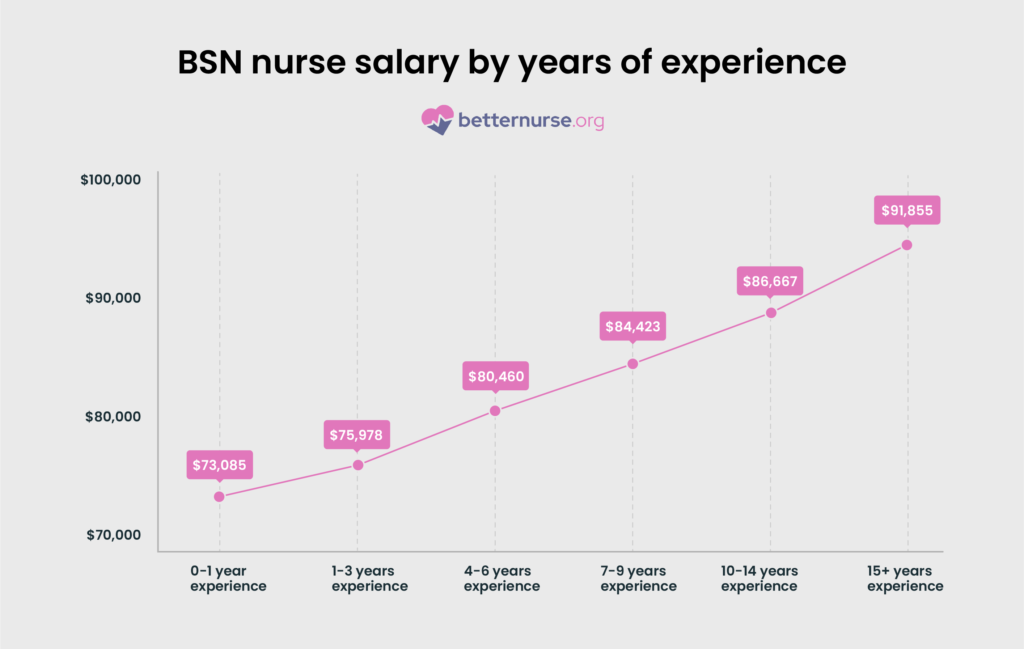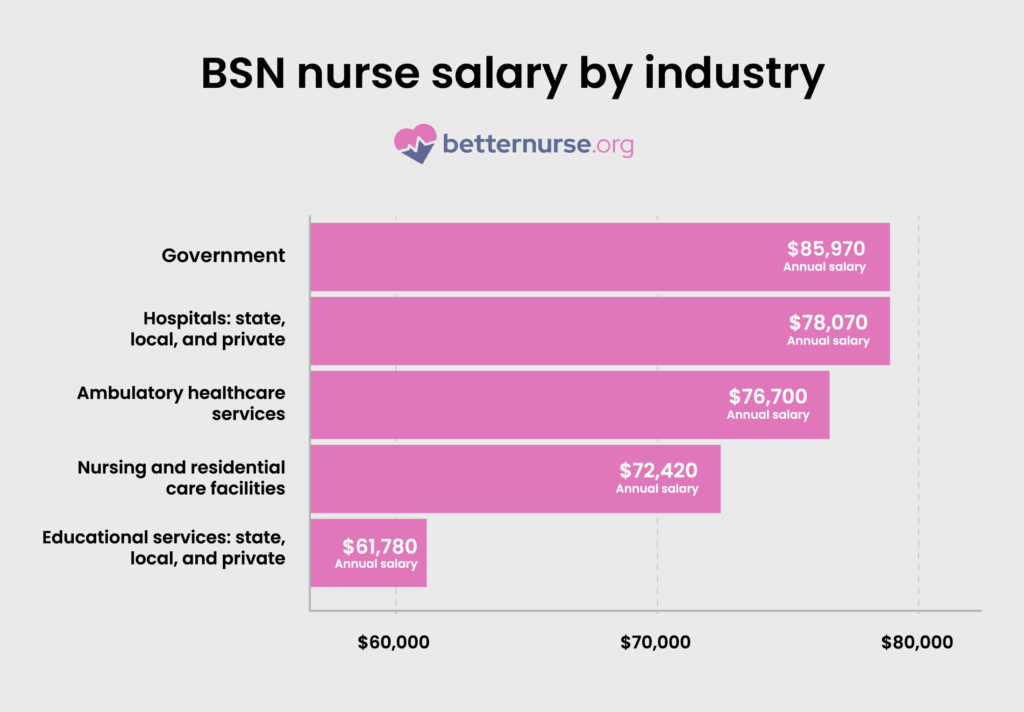As healthcare needs continue to grow and evolve, there is a growing demand for nurses with advanced education and specialized training. In particular, registered nurses (RNs) with a Bachelor of Science in Nursing (BSN) degree are in high demand in the healthcare industry. Their salaries can vary depending on several factors, such as years of experience, work setting, and geographic location.
In this article, we will explore the topic of BSN nurse salaries in-depth and provide information on how much RNs with a bachelor’s degree typically earn in the United States as well as the factors that can impact their earnings.
Table of contents
What Is a BSN Nurse?
A BSN nurse is a registered nurse who has earned a Bachelor of Science in Nursing degree from an accredited university or college. This degree provides a comprehensive education in nursing theory, research, and clinical practice, as well as a broader understanding of healthcare delivery systems, policies, and economics.
BSN nurses are prepared to work in various healthcare settings, including hospitals, clinics, and long-term care facilities. They are qualified to provide a full range of patient care services, from basic health assessments to complex medical interventions. These nurses also possess strong critical thinking and leadership skills, allowing them to effectively manage patient care and work collaboratively with other healthcare professionals.
In summary, BSN nurses are highly skilled and knowledgeable healthcare providers equipped to deliver high-quality patient care and contribute to the advancement of the nursing profession.
BSN Nurse Salary & Job Outlook
According to ZipRecruiter, the median annual wage for BSN nurses is $87,304. However, salaries can vary depending on factors such as experience, location, and employer.
The U.S. Bureau of Labor Statistics (BLS) also reports that the employment of registered nurses, including BSN nurses, is projected to grow by 6% from 2021 to 2031, which is approximately as fast as the average growth for all occupations. This growth is due to various factors, including an aging population, increased demand for healthcare services, and a growing emphasis on preventative care.
In addition, there is a growing preference among healthcare employers for BSN nurses, as they are seen as more qualified and better able to handle the complex challenges of modern healthcare.
BSN nurse salary by state
BSN nurse salaries can vary across states due to the cost of living, nurse demand, and availability of healthcare resources. According to ZipRecruiter, the states with the highest median annual wages for BSN nurses are Washington, New York, Idaho, and California, with salaries ranging from $91,162 to $102,317 per year. Conversely, states such as North Carolina, Louisiana, Georgia, and Florida have the lowest median annual wages for BSN nurses, ranging from $61,393 to $68,861 annually.
However, it is essential to note that salary is not the only factor determining nurses’ job satisfaction and quality of life. Other factors such as job security, work environment, and career growth opportunities should also be considered.
Refer to the map below to see the average salary for BSN nurses in all 50 states.
BSN nurse salary by years of experience
BSN nurses can expect their salaries to increase as they gain more experience in their field. According to recent data, a BSN nurse’s salary can range from $73,085 to $91,855 based on years of experience. Here are the expected salaries for BSN nurses at different levels of experience:

BSN nurse salary by industry

BSN nurse salaries can also vary based on the different work settings they work in. According to the Bureau of Labor Statistics, the highest-paying industries for registered nurses (including BSN nurses) are government agencies, with a median annual salary of $85,970, followed by hospitals (state, local, and private), with a median yearly salary of $78,070.
The median annual wage for nurses employed in ambulatory healthcare services was $76,700, while nurses employed in nursing and residential care facilities earned a median yearly salary of $72,420. And lastly, nurses working in educational services (state, local, and private) earned a median annual salary of $61,780.
Additionally, some work settings may offer other benefits such as flexible scheduling, tuition reimbursement, or opportunities for career advancement.
How To Increase Your Salary as a BSN Nurse
There are several ways to increase your salary as a BSN nurse. One way is to pursue additional education and certifications, such as obtaining a Master of Science in Nursing or becoming certified in a specialty area like critical care or oncology. This additional training can make you a more valuable asset to your employer and increase your earning potential.
Another way to increase your salary is to seek out employment in higher-paying work settings, such as government agencies or hospitals. In addition, taking on leadership roles or management positions can also result in higher salaries.
Lastly, negotiating salary and benefits during the hiring process or during performance reviews can also lead to higher pay. However, it is important to do your research and have realistic expectations when negotiating your salary.
Should You Become a BSN Nurse?
The decision of whether or not to become a BSN nurse is a personal one that depends on an individual’s career goals, interests, and financial situation.
A BSN degree can provide a solid foundation in nursing practice, critical thinking, and leadership skills, opening up more career opportunities and potentially leading to higher salaries. Additionally, the healthcare industry is rapidly growing, and the demand for nurses with advanced education and training is increasing, which means you won’t have trouble finding a job.
However, pursuing a BSN degree can require a significant investment of time and money. Some individuals may prefer to start their nursing careers with an associate’s degree or diploma program. Ultimately, it is important to carefully consider your goals and resources and to research various educational options and career paths before making a final decision.
Benefits of being a BSN nurse
If you want to obtain your BSN degree, you will be happy to hear that the benefits of becoming a BSN nurse are manifold. Some of the advantages of becoming a BSN nurse include:
- Greater career opportunities: BSN nurses have more job opportunities and are often considered for higher-level nursing positions, such as management or leadership roles.
- Higher earning potential: BSN nurses generally earn higher salaries than those with an associate’s degree or a diploma in nursing.
- Enhanced clinical knowledge: BSN programs provide students with a deeper understanding of nursing practice, research, and healthcare systems, which can improve their clinical knowledge and decision-making abilities.
- Improved patient outcomes: Studies have shown that hospitals with a higher percentage of BSN nurses have better patient outcomes, e.g., lower mortality rates and fewer complications.
- Preparation for advanced practice nursing: A BSN is typically required for admission to graduate nursing programs, which prepares nurses for advanced practice roles such as nurse practitioner or clinical nurse specialist.
- Personal fulfillment: BSN nurses often report a greater sense of personal and professional fulfillment, as they have the knowledge and skills to positively impact patient care and healthcare delivery.
What’s the Bottom Line?
BSN nurses are highly valued in the healthcare industry due to their advanced education and training. Their salaries vary depending on several factors, such as years of experience, work setting, and geographic location.
While the median wage for BSN nurses is competitive, there are opportunities to increase earning potential even more through additional education, certifications, and pursuing employment in higher-paying work settings.
As the demand for BSN nurses continues to grow, it is essential for individuals considering a career in nursing to carefully consider their education options and to research various career paths and opportunities.
We hope this guide has been a valuable resource for you in exploring the salaries of BSN nurses. If you want to learn more about different career options in healthcare and the wages they offer, you can click here and discover different pathways you can take as a nurse as well as find a high-paying nursing career that best suits you.

Nurse Luke is a CRNA who specializes in Nursing content and still enjoys a very busy career with Locum, Per Diem and Travel nursing in the greater midwest. He has over 25 years of experience in the healthcare field and received his CRNA masters degree from the Mayo Clinic School of Healthcare. He is passionate about helping nurses explore the options of becoming a travel nurse as well as spending time with his Family.



